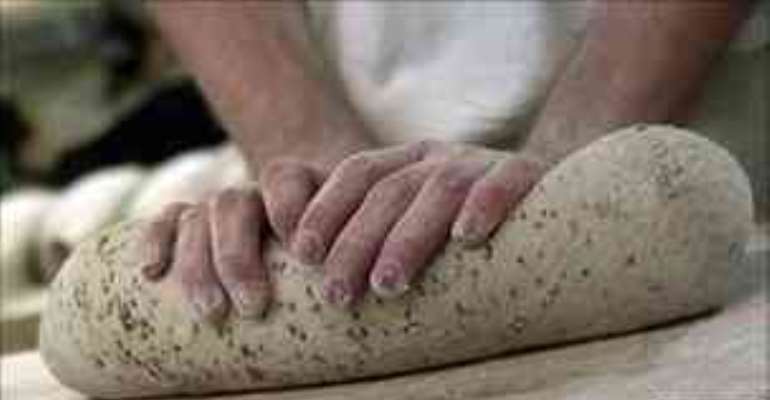UK INFLATION RATE REMAINS AT 3.1%

Rises in the price of bread, cereals and vegetables helped to keep the inflation rate high
UK Consumer Prices Index (CPI) inflation remained unchanged in August at 3.1%, according to the Office for National Statistics (ONS).
It means the rate remains well above the Bank of England's 2% target, and it brings to an end a three-month period during which the rate had been falling.
The unexpectedly high rate was boosted by strong rises in air fares, clothing and food. Fuel prices fell.
Retail Prices Index (RPI) inflation slowed to 4.7%, down from 4.8% in July.
Continue reading the main story
UK Economy: The Recovery
Economy tracker: GDP
What's changed for the UK economy?
What might the UK economy look like in the future?
UK inflation rate remains at 3.1%
CPI is used for the Bank of England's target. However, RPI – which includes more housing costs – is important for wage negotiations, and is used to calculate certain benefit increases and mortgage payments.
Economists had forecast lower rates of inflation for August, with CPI expected at 2.9% and RPI at 4.6%.
The news could strengthen the position of Andrew Sentance, the member of the Bank's Monetary Policy Committee who broke ranks over the summer to vote in favour of an interest rate increase.
The pound jumped 0.6% against the dollar on the news, to $1.544, as markets priced in the probability that UK interest rates may rise sooner than previously expected.
Food prices
Continue reading the main story
Analysis
Hugh Pym
Chief economics correspondent, BBC News
Unchanged inflation rate – hardly a headline to get the pulses racing.
But this is a rate still way above the Bank of England target and if it stays there another letter to the chancellor will be required in a couple of months time.
Food price inflation is ticking upwards and is now at 4.1%.
Global commodity price pressures loom large and British retailers will be hard pushed to resist them.
There are warnings from clothing manufacturers that their raw material prices are soaring. Things aren't going to get any easier for consumer budgets.
Air fares, which tend to rise during the summer holiday months, jumped 16% in August – their sharpest rise for the month on record.
Clothing and footwear prices rose at their fastest monthly rate for an August since 2001, although prices remain below their level of a year ago.
The news follows a warning from department store Debenhams, who said on Tuesday that the entire UK clothes retail industry faced higher prices, thanks to the rising cost of cotton and the weak pound.
The warning was echoed comments by retailer Primark on Monday that rising costs may eat into its profit margins over the coming year.
Summer sales discounts happened earlier in the year than usual, meaning that discounting had a relatively smaller impact on the August data than usual.
Food costs continued to rise, with bread, cereals and vegetables leading the way.
Wheat prices hit a 22-month high in August after rising more than 50% since the end of June.
Target missed
More worryingly for economists, the core inflation rate rose to 2.8%, from 2.6% in July.
Core inflation strips out volatile food and energy prices, and is used to gauge the underlying longer-term inflation trend.
The CPI inflation rate has now remained above the Bank of England's target for nine months.
Continue reading the main story
'
Start Quote
Inflation is a stealthy enemy that quietly erodes the spending power of a saver's hard earned nest egg.'
Darren Cook
Moneyfacts
Mervyn King, the Bank's governor, is likely to be disappointed that the rate has remained outside the government's 1%-3% tolerance range for another month.
Last month, he had to write a letter to the chancellor of the exchequer explaining why the rate was still more than one percentage point above its 2% target.
He blamed temporary factors, including the return of VAT in January to 17.5%, past rises in oil prices and higher import prices as a result of the depreciation in the pound since the middle of 2007.
However, he said “there remains a significant probability that I will need to write further open letters to you in the coming months”.
VAT is set to rise again, to 20%, in January next year, giving a further boost to headline inflation figures.
Eroding savings
Consumers say they have noticed prices rising
The continuing high rate of inflation will be bad news for savers.
With interest rates at record lows, the real value of savings is being steadily weakened.
“Inflation is a stealthy enemy that quietly erodes the spending power of a saver's hard-earned nest egg,” said Darren Cook of the financial information service Moneyfacts.
He points out that a basic rate taxpayer needs to find an account paying 3.88%, while a higher rate tax payer needs to find an account offering 5.17%, in order to maintain the real value of their savings.
“The average instant access savings rate is still at rock bottom at a rate of only 0.77%,” said Mr Cook.
“Only 91 out of a possible 1,020 accounts allow a basic rate tax payer to just break even at 3.88%.”
The average savings pot of a basic rate tax payer is in effect being eroded by 2.48% per year.
